#the panels are from ch 77 btw
Text
Dazai Osamu (BSD): a case study of a nihilist turned absurdist
I've talked a bit before about the themes of absurdism within BSD, and I think this plays heavily into Dazai and the personal journey he's gone on throughout the series (light novels included). From my perspective, his character development has followed a shift in ideology, from nihilism to absurdism.
First, I'd like to define how these two philosophies are similar yet different. Nihilism is the belief that life is intrinsically meaningless, and that there's no value to seeking meaning. Absurdism also believes that life has no intrinsic meaning, but states that revolting against the absurdity of existence is the way to create meaning.
While I don't think Dazai 100% fits either category fully at any given point in his life as we've seen it thus far, I think in his PM days he leans more towards a nihilist perspective, and following Oda's death he leans more towards an absurdist perspective.
Dazai's reasoning for joining the PM was because he thought that perhaps being around violence and raw emotions would help him understand humanity, giving him a reason to live. This doesn't sound quite like nihilism, but honestly, I think he gains a more nihilist point of view as time progresses and he realizes that he can't find meaning in the PM. I'm not even sure he believed that there was meaning to find in the first place, he was just desperate to prove himself wrong, and then failed, which really cemented this nihilistic mindset for him.
Friedrich Nietzsche, often regarded as the founding father of nihilism, claimed that nihilism "not only the belief that everything deserves to perish; but one actually puts one shoulder to the plough; one destroys.”
If life doesn't have meaning, then it doesn't matter to Dazai if he destroys. So, he fills a corpse with bullets, he horrifically abuses his subordinate, he actively tries to take his own life.
Nihilism is right in line with his suicidal nature. This isn't to say that all nihilists are inherently suicidal, but when one believes that life has no meaning, it's quite easy to come to the conclusion to kill oneself. I think this mindset really lends to his general depression and suicidal ideation, on top of the fact that he feels generally disconnected from humanity. It's so easy for him to consider himself inhuman because he has this nihilistic point of view that nothing matters and everyone else in society seems so dead set on opposing that worldview.
And then you have Oda. He is the closest thing Dazai gets to finding meaning within the PM. Like Chuuya, this is a person that fascinates Dazai, although his reason for fascination is much different. To Dazai, Oda represents what is good in the world, he thinks that he is a good man, and struggles to reconcile how a good person can come out of an existence so seemingly pointless and horrific.
Then, Oda dies.
It's an absurd occurrence, and to Dazai it only proves that life has no meaning. This is exemplified when Dazai speaks to Fyodor about God in Meursault: "[God] is known for is famous for his coincidences and absurdism, I've seen it countless times," and a flashback to Oda's death is shown. A good man died for seemingly no good reason, and to Dazai, this only proves life's meaningless, because to the universe it didn't matter who Oda was, he died, regardless.
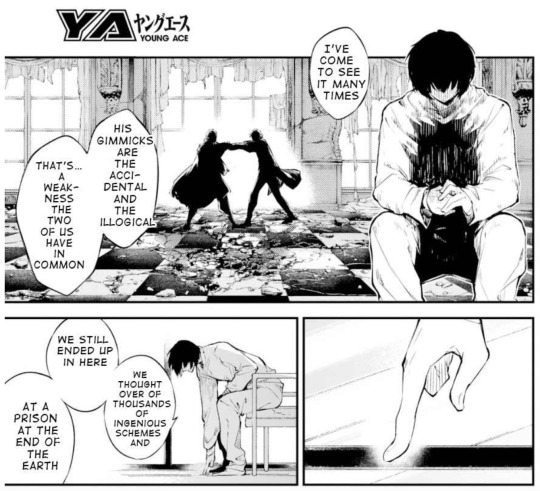
(I quoted the dialogue from the BSD anime English dub because I feel it better suited my argument, but you can see that he's essentially saying the same thing).
This event should have only further cemented Dazai as a hardcore nihilist, but fortunately for him, Oda was able to get a word in before he passed. He told Dazai that as long as he believes the sides of good and bad are the same to him, he should be on the side that helps people. Oda suggests fighting against life's inherent absurdity -- and that's absurdism in a nutshell, revolting against a meaningless universe.
Dazai takes his advice, and within a few years, he's working for the ADA, he's on the side that helps people.
In that same conversation with Fyodor, Dazai speaks further about life's meaning:

"Those who scream within the storm of uncertainty and run with flowing blood." That's absurdism, the rebellion against uncertainty, meaninglessness, absurdity.
While I don't think Dazai is a bona-fide absurdist due to his suicidality (absurdism basically sees suicide as giving into meaninglessness), I think he's on his way there because of moments like this.
I don't think he's totally convinced that life is completely and utterly meaningless anymore. He, at the very least, has a respect for those who forge their own meaning through the act of revolt.
"Man stands face to face with the irrational. He feels within him his longing for happiness and for reason. The absurd is born of this confrontation between the human need and the unreasonable silence of the world." - Albert Camus
#bsd#bungo stray dogs#bungou stray dogs#dazai#dazai osamu#character analysis#philosophy#absurdism#nihilism#soup rants#the panels are from ch 77 btw
240 notes
·
View notes
Text
Don't let them see you kill
(...at least not yet)
While scrolling through some pages on Japanese culture I came across the concepts of shame and guilt culture. I immediately thought of Light and Soichiro as I read it. So let’s see how this applies to these Death Note characters.
(This is my very first meta, so please don’t be harsh with me. I’d like to hear what you think about this. For @lux-mea-lex. Hope you enjoy!)
Most Western countries are labelled as guilt cultures; mainly Middle East and Asian countries count as shame cultures. The concept itself is disputed and was established by Ruth Benedict in her book on Japanese culture, “The Chrysanthemum and the Sword “, a study which was meant to help the Americans defeat Japan in World War II by gaining a better understanding of their enemy's society. In a guilt culture, you (are expected to) feel guilty if you did wrong, no matter what other people think. Even if other people are convinced of your innocence, you feel bad regardless. By contrast, in a shame culture wrong-doing is sanctioned not by the self but by other people. You will feel shame once your misbehaviour is discovered. If no one knows you did wrong it's okay because you are not openly shamed and dishonoured. Though innocent, you can still be shamed by the belief of other people. (If you're interested, you can read more here.)

Soichiro and guilt culture
"No matter what people think of me"
Soichiro is a dutiful police officer who pushes himself to limits for "justice". In many instances, he acts according to what he believes to be right with no consideration of the way other people view his behaviour. For example when he learns Kira is suspected among his family he doesn't argue that monitoring is unacceptable like his Japanese colleagues do... he even demands putting cameras and wiretaps everywhere before L says so. He doesn't want to shy away from the truth. This also becomes clear when he talks to Kitamura later in the story (ch. 21) and straightforwardly (and obviously pained) tells him that Light is the main suspect (but he asks him not to tell anyone... simply for the investigations sake, because L told him not to tell anyone... or, most likely, he saw it as his personal failure?). Another interesting thing to note about this scene is Soichiro's reaction to Kitamura stating that the public believes L and the police to be incompetent. He is outraged.
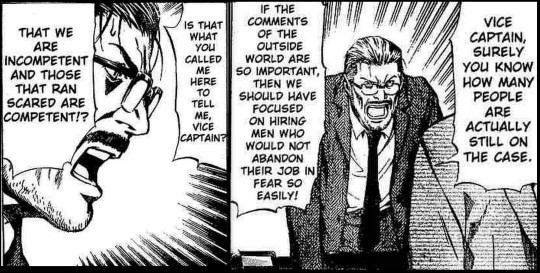
Soichiro is angered not only because his team's competence is questioned but apparently also because Kitamura seems to care more about the public opinion than about what's really going on (people sacrificing their lives to catch Kira and a team short on staff, not on skill), typical for shame culture. Soichiro, on the other hand, is again devoted to truth, he "fights the accusation" if we apply this to the guilt cultural concept.

Just like in a guilt culture, he doesn't need other people who perceive his actions as wrong to feel bad about his choices. After Sayu's kidnapping and the notebook exchange, Soichiro immediately decides to resign from the police. He sees himself as no longer fit for the job because he put his daughter's survival first when ideally he should be ready to leave her to die so he does not have to hand over the Death Note (he demands inhumane behaviour of himself, I think). Light tries to talk him out of it by telling him that it seems as if Soichiro tries to escape responsibility. He doesn't, Soichiro wouldn't run away from responsibility knowingly (and Light should and does know. Is this his -failed- attempt at manipulating his father? Making him believe that he would assume responsibility not by leaving but by staying with the police?). In this situation, Soichiro could have easily gone along with what Light said... and make himself believe a comfortable lie. But he doesn’t.
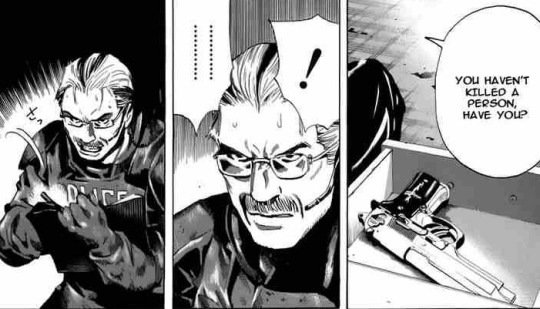
Soichiro’s internal moral compass is extremely strong. In this case, his “audience” would have never judged him for killing Mello (which would be like a carte blanche for Light but more on that later). Soichiro can’t kill to save his life...
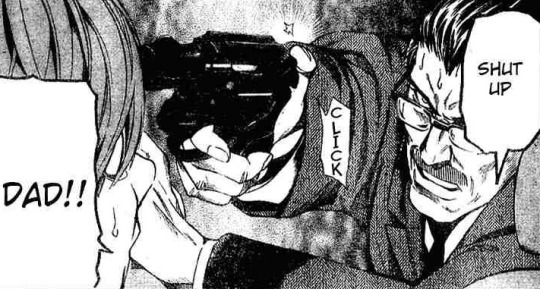
...but to take it. Soichiro as his own judge would also hand out his own punishments. Light actually believes his father would kill him and then himself if he turned out to be Kira, just like L suggests and Soichiro doesn’t contradict (ch. 35). In this (fake but could be real) shooting scene, there’s no one for Soichiro to justify his actions for. He does it, to quote him, because it’s his “responsibility as a parent [...] and as the chief of police”. (Btw this reminds me strongly of Seppuku, a form of suicide for samurai as a punishment). Attitudes on death penalty are interesting, too - both Light and Soichiro seem to see it fit as a punishment; Soichiro is more “consequent” about it as he would also consider applying this punishment to himself.
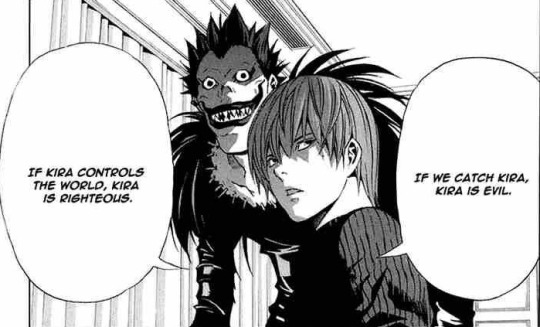
Light and shame culture
“If we catch Kira, he is evil.”
I remember how much this statement confused me in the beginning. What difference does it make on how morally right or wrong Kira’s actions are if he’s caught or not? I just couldn’t wrap my mind around it. To me, moral standards are a fixed thing. Not to Light. What matters most to him is how other people see and evaluate his actions, very much fitting with shame culture. It’s also obvious in his speech in the warehouse.

This goes along the same line of thinking. It’s about “the people’s will” that Light, Kira had to win. Light’s main goal is that people won’t “condemn him as evil”. Other people’s opinions? Extremely important to Light. Near deconstructs Light’s dream world in which he is admired as a God by all without his killings being questioned/seen as wrong.
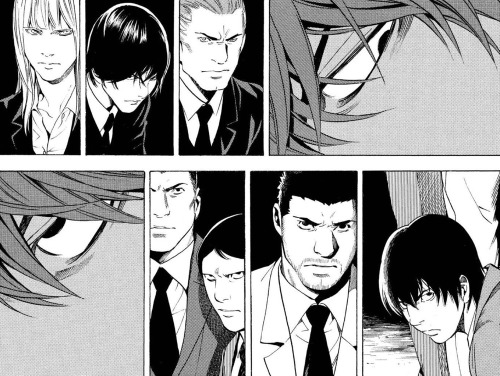
These panels illustrate it beautifully... what Light fought years for, being perceived as perfect, falls apart as he is quite noticably openly shamed. Look at the disdain in their eyes (and Light can’t bear it and looks away). (More about these panels and great meta on Light’s issues with perception that ties in quite well with the shame cultural concept here by lux-mea-lex.) Another panel that fits this well is Light being stripped bare, exposed as Kira in front of an audience. The shaming - something Kira!Light tried to change into an act of admiration, respect, maybe fear, if he ever “came out” as Kira to the world (which he would willingly only do in his “ideal world”, if ever). Maybe Demegawa isn’t wrong when he says “if public opinion denies Kira, Kira will disappear by himself” (ch. 77).
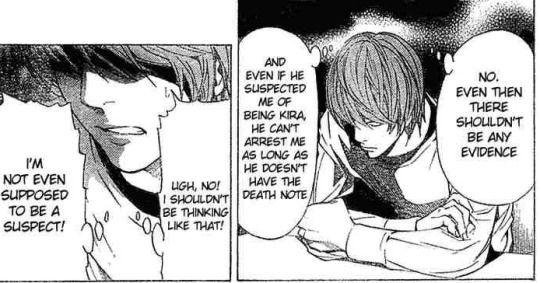
Remember? Even if you’re innocent, you can still be shamed by suspicion only. “There's no smoke without fire", suspicion can taint your public image irremediably.
It’s interesting to note that there’s a point where Light’s in a situation that mirrors Soichiro’s and Kitamura’s in ch.1. Light’s “boss”, a teacher, throws chalk at him to get Light to pay attention in class and says: “We’re counting on you to make us look good!”, which sounds very shame cultural, and Light actually complies and apologizes to his teacher (personal comment: what the heck?!).
When you take the concept of shame culture a bit further it fits well with the concept of Honne and Tatemae (your true face vs. the socially acceptable front you put up) or Light’s use of masks and disguises - because it’s what’s on the surface that matters most, not the truth. This supports the reading of Death Note as critique of the Japanese society.
Light would never self-apply a punishment like his father does. In the anime as he stumbles down the alley after his second “successful” use of the Death Note, he says this in his internal monologue: “It won’t be overlooked.” (Ep.1) Either he is talking about God/s recognizing his wrong doing or it’s a sort of irrational fear that people will be able to tell that he has killed. Again, it’s about the perspective of something other on his actions, judging them. And considering how easily Light considers killing someone for a small offense (I here go along Light’s reasoning of criminals “deserving to die”, this is not my personal opinion), he can’t be talking about his own opinion in ch.1 when he says: “of course, these are lives... that can’t be easy.”
However, there is one scene that sticks out because Light takes a step in a different direction.

L asks him to think on the question if it was Light’s will or not that the Kira powers have been passed on... and Light answers honestly, “it was Light Yagami’s will”, essentially fueling the suspicion of him being Kira after talking himself out of facing the truth of his weirdly discontinuous memory the whole time in the Yotsuba!Arc prior to this moment. It shows us potential in Light’s character development to becoming a more honest version of himself but this sprout never gets to blossom during Death Note as Light regains his memories and plots L’s death as Kira.
43 notes
·
View notes